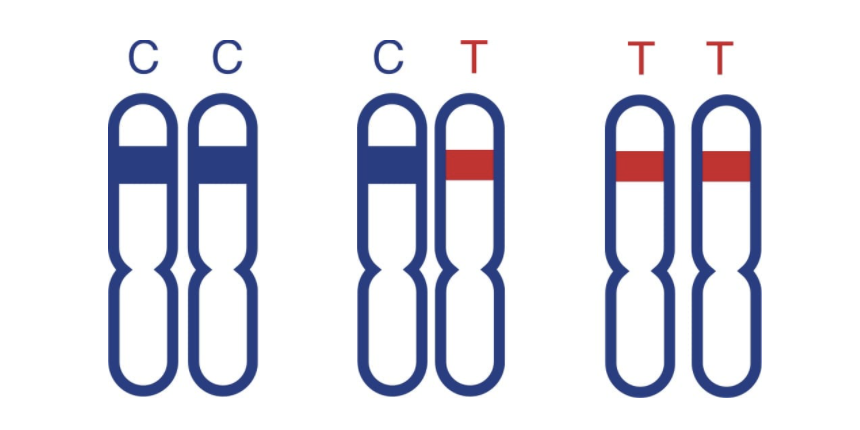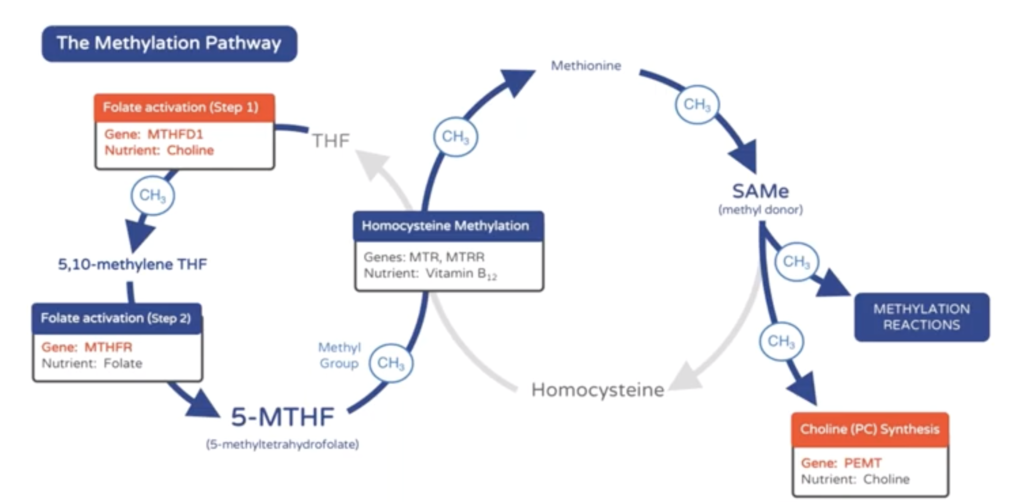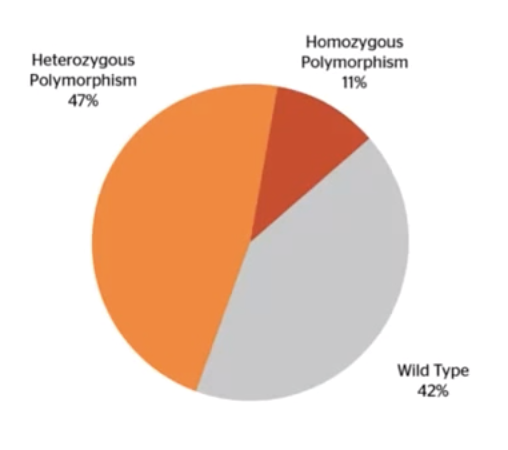Nutritional Genomics – when your genetic tests matter
Nutrigenomics is a scientific discipline that studies the relationships between our genes, nutrition and health—all the way down to the molecular level. This knowledge helps us understand how genetics affects nutritional needs, and informs what steps we can take to help improve overall health.
We are all unique. While we all have the same genome, meaning we all have the same genes , we don’t all have the same versions of those genes. A gene is a section of DNA that has a specific code that tells the cell what to do. It is effectively giving it instructions to make a specific protein.
Throughout the genome there are typos. This is where there is a substitution for one nucleotide for another. These are known as a single nucleotide polymorphisms (SNP). With more than 10 million SNPs present in the human genome, they serve as biomarkers or signposts that have the potential to inform us about an individual’s traits or requirements. However not all SNPs matter – only a few are clinically relevant.
Everyone carries two copies of every gene, and a SNP may affect one or both copies. Each result is a two-letter combination, which is known as a variant. SNPs are therefore distinguished between normal (wild type) or variant version of the gene. SNPs are not necessarily bad but they do make us different from one another. Everything from hair colour to behavioural features can be affected by SNPs.

Genes encode proteins and these protein have distinct shapes and functions. They include enzymes, transporters and receptors. The protein that is made depends on the sequence of that code – if there is a typo present (or a SNP) it could affect the enzyme that is made.
By the way we have loads of DNA and many variations present will have no medical relevance at all . In some cases combined effects of SNPs can have a greater impact or may actually mitigate their effects on each other. This can make it difficult to identify when something is actually relevant in clinical practice.
In reality most of the information on SNPs are not ready for clinical practice when it comes to interpretation and application. For a SNP to be relevant it needs to be:
Well researched
Clinically relevant
Responsive to nutrition / lifestyle intervention
Some have much more research than others – the genes are given RS numbers so you can look at the research available on any RS number to see what is available. SNPs are given a science rating to help you identify which ones are most studied. Several SNPs directly affect nutrient assimilation and response to supplementation – these are very useful to know about as they can help tailor your supplement programme and dietary recommendations.
Just because you have a SNP does not mean it is affecting you – our genes interact with our diet, lifestyle and other factors as well as each other. So whenever you are looking at SNPs you need to look at them in relationship to the individuals health, signs and symptoms and any other lab tests undertaken. Personalised assessment is your next step and this is essential. What genetic testing can do is help you fine tune assessment to identify what lab tests may be more important for someone and this can then help with personalised nutrition recommendations.
As an example there are many SNPs linked to body weight and responsiveness to foods. But just having a number of SNPs linked to higher body weight does not mean you will be obese. Other genetic SNPs, your diet and lifestyle will all play a role.
However what certain genetic SNPs may help with is tailoring your diet – whether that is the balance of macros you are eating, types of foods, overall calories or exercise recommendations. Certain SNPs for example may suggest that you would be better off with a lower saturated fat intake or a higher protein intake if you are looking to change your body composition.
For example those with APOA2 GG allele they may find that a ketogenic diet really does not work for them, they may even put on weight and actually they would get much better results when it comes to losing weight on a lower saturated fat diet.

Epigenetics influences how a gene is switched on and how genes are expressed. Our DNA is a dynamic process – genes can be expressed at different times in our life based on age, nutrition, environment / lifestyle and the diet we eat. So one of the advantages of knowing our SNPs is looking at your predisposition, knowing what tests may be helpful for you and how modifying our diet and lifestyle could impact the expression of these genes.
As an example there are many genetic variations that can influence methylation.

How do you know whether your genetic variations are relevant to you? Well undertaking certain lab tests could be helpful here. For example looking at your homocysteine levels can give you information about how well this methylation cycle is working. I would also look at your own signs and symptoms – are you struggling with stress, anxiety or depression for example?
We know that the 677 MTHFR genetic SNP can be linked to depression. This is because it influences the availability of folate which helps with methylation and in turn the ability to create neurotransmitters like serotonin and dopamine which influence our mood.

Patients with the 677C-T variation (which affects 47% of the population) have 1.36 times greater chance of requiring support for mood and nearly 50% of the population have this variation (Heterozygous)
Those who have the TT genotype are twice as likely to suffer with depression compared to the normal population. (about 11% of the population)
It does not mean of course that nearly 50% of the population WILL suffer with mood issues as many other factors play a role but this SNP can be influenced by nutrition and diet. It may for example that this becomes more important at certain times of your life – perhaps your diet changes, your enter the Menopause, experience high stress in your life or simply as you age.
Genetic data alone cannot inform nutrient dosage or duration of supplementation. It can only inform predisposition. Using additional lab assessment can help with this. What genetic SNP testing does do is reduce the trial and error in both assessment and intervention. It can explain why a particular program or diet has not worked for an individual. It can also tailor more precisely what lab testing or other assessments may be most beneficial for an individual and it can explain why you may be more prone to either certain symptoms, health conditions or need certain nutrients more than others.
I use genetic testing in my practice and recommend my clients undertake 23andMe testing. Using the patients genetic raw data file from 23andMe I can then utilise the test data and help the client translate this into evidence based nutritional and lifestyle recommendations based on their unique genetic profile.
For more information please contact our clinic

